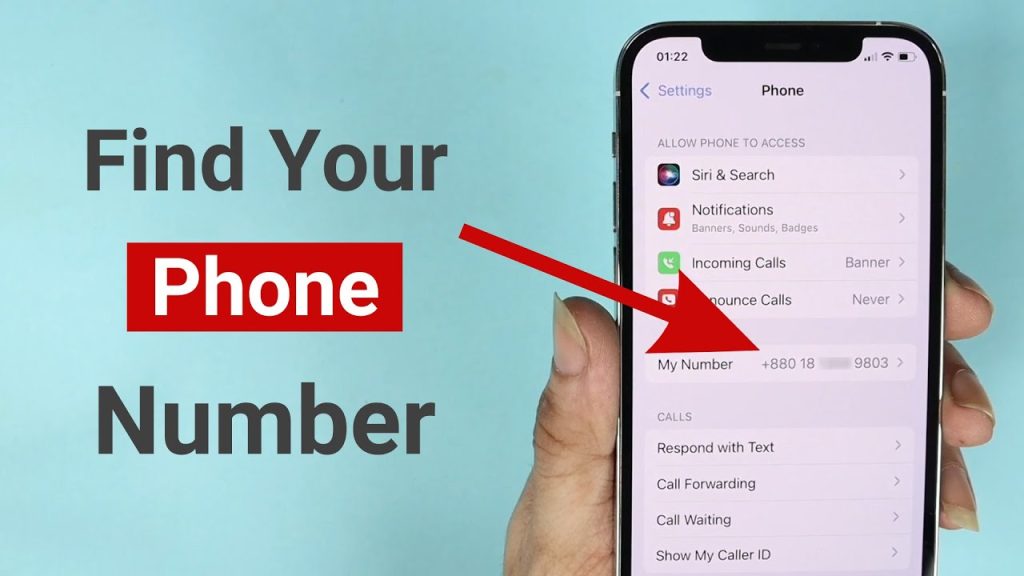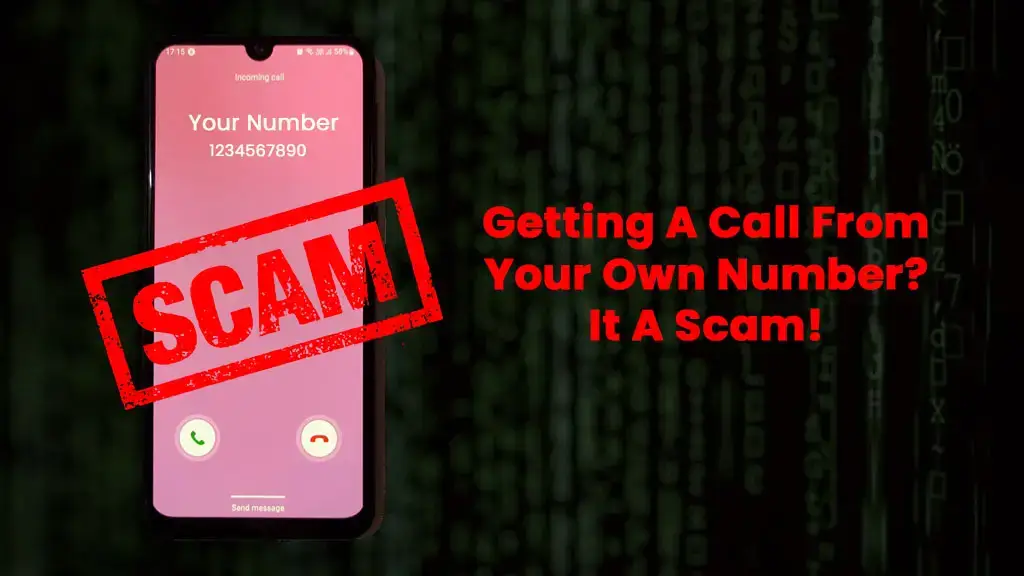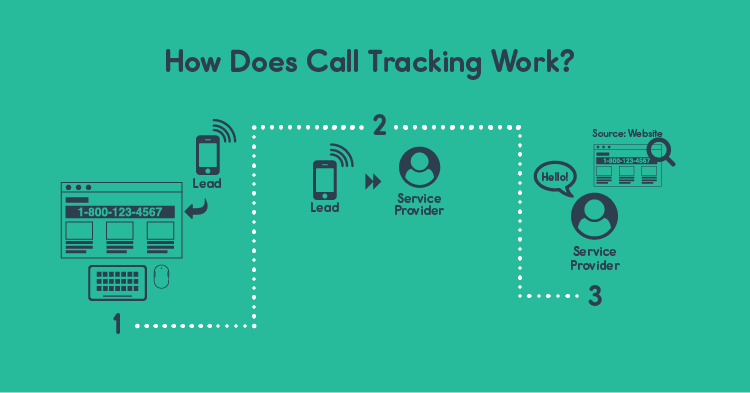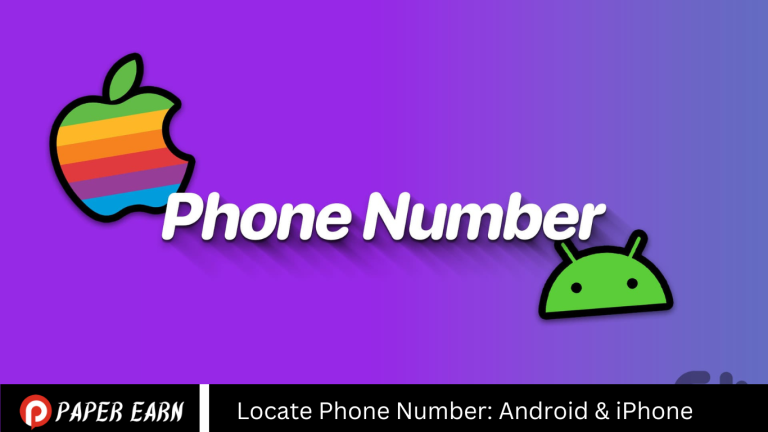Locating your phone number on Android and iPhone devices is crucial for various tasks, from setting up new accounts to sharing contact information. This guide will explore the simplest methods to find your phone number on both platforms. Let’s delve into the steps for Android and iPhone, ensuring you can easily access this vital information whenever needed.
How to find your phone number on iPhone
Finding your phone number on an iOS device is simple and convenient due to the uniformity of iOS versions among users. You have two straightforward methods to locate your phone number: through the Contacts app or within the settings.
In the Contacts app, open the Phone app, tap on Contacts, and your phone number will be displayed as the first entry.

Alternatively, in the settings, navigate to Settings > Phone, where you’ll find My Number listed as the first field. You can easily modify or edit this number by tapping on it if necessary.
Getting a call from your number?
Receiving a call from your number can be alarming, especially after you’ve just confirmed or memorized your phone number. However, it’s crucial to remain vigilant as this scenario may indicate a scam. The Federal Trade Commission (FTC) has cautioned that certain robocalls and scammers employ number spoofing tactics, using your number in the hopes that you’ll answer. This strategy allows them to circumvent number-blocking measures, as individuals typically don’t block their numbers. If you encounter an incoming call displaying your number, rest assured it’s not a call from an alternate reality. It’s likely a scam, so it’s best to refrain from answering.

Importance and Legal Considerations
Tracking phone numbers can serve various purposes, including finding lost devices, ensuring the safety of loved ones, or monitoring company-owned devices. However, respecting privacy rights and adhering to legal regulations governing phone tracking activities is crucial. Depending on your jurisdiction, tracking someone’s phone without their consent may be illegal and could result in severe consequences.
How Phone Number Tracking Works
Phone number tracking relies on GPS, Wi-Fi, and cellular network data to pinpoint a device’s location. Android and iPhone utilize their respective operating systems and associated services to provide tracking functionalities. These systems often require the user’s explicit consent and may offer options for controlling location sharing and privacy settings.

Tracking a Phone Number on Android:
Using Google’s Find My Device
Google’s Find My Device is a built-in feature on Android devices that allows users to locate lost or stolen phones. To use this feature, users must have a Google account linked to their device and have the Find My Device feature enabled in the device settings. Once activated, users can log in to their Google account from any web browser or Android device to locate their phone on a map, ring it, lock it, or erase its data remotely.
Third-Party Tracking Apps
Numerous third-party tracking apps on the Google Play Store offer advanced tracking features beyond what Google’s Find My Device provides. These apps often have additional functionalities such as geofencing, real-time location tracking, and location history logging. Popular options include…
Using Carrier Services
Some mobile carriers offer tracking services as part of their subscription packages. These services typically allow users to track the location of their family members’ devices or other devices connected to the same carrier account. Users can access these services through their carriers’ dedicated mobile apps or web portals.
Best Practices for Phone Number Tracking:
Privacy and Security Concerns
Respect the privacy of individuals when tracking their phone numbers, especially if they haven’t consented to being tracked. Avoid using tracking tools for malicious purposes or violating privacy rights.
Legal Implications
Familiarize yourself with the legal regulations governing phone tracking activities in your jurisdiction. Obtain consent from individuals before tracking their devices whenever possible, and refrain from engaging in illegal tracking practices.
Ethical Use of Tracking Tools
Use tracking tools responsibly and ethically, focusing on legitimate use cases such as locating lost devices or ensuring the safety of family members. Avoid using tracking tools to invade someone’s privacy or engage in surveillance without proper authorization.
Frequently Asked Questions
Is it legal to track a phone number without consent?
The legality of tracking a phone number without consent varies depending on your jurisdiction. Monitoring someone’s phone without their explicit permission is illegal in many places. It’s essential to familiarize yourself with the laws in your area regarding phone tracking activities and obtain consent whenever necessary.
How accurate are phone tracking methods on Android and iPhone?
The accuracy of phone tracking methods can vary depending on factors such as the area’s availability of GPS signals, Wi-Fi networks, and cellular towers. Built-in tracking features like Find My Device on Android and Find My iPhone on iOS offer relatively accurate location data. At the same time, third-party apps may vary in accuracy based on their technology and capabilities.
Can I track a phone number if the device is turned off or offline?
Tracking a phone number becomes challenging if the device is turned off or offline, as it relies on active connections to GPS, Wi-Fi, or cellular networks. In such cases, you may only be able to track the device’s last known location before it went offline.
Are there any privacy concerns associated with tracking phone numbers?
Yes, privacy concerns are associated with tracking phone numbers, especially without the individual’s consent. Tracking someone’s phone without permission can violate their privacy rights and may lead to legal consequences. Respecting privacy and tracking phone numbers for legitimate purposes with proper authorization is crucial.
What should I do if I suspect my phone is tracked without consent?
If you suspect your phone is being tracked without consent, you should immediately protect your privacy and security. This may include reviewing your device settings to ensure location sharing is turned off for unauthorized apps, contacting your mobile carrier for assistance, or seeking legal advice if necessary.
Can I track the location of a phone number in real time?
Android and iPhone offer features and third-party apps that allow users to track phone numbers in real-time provided that the tracked device has an active internet connection and location services enabled. Real-time tracking can help monitor the whereabouts of family members or recover lost or stolen devices.
Are there any subscription fees associated with using tracking services on Android and iPhone?
While some tracking services may be free, others may require subscription fees or premium features for full functionality. Built-in tracking features like Find My Device on Android and Find My iPhone on iOS are typically free to use with the respective devices’ operating systems. Third-party tracking apps may offer free and paid subscription plans with additional features.
Can I track the location of a phone number if I only have the phone number and no access to the device?
Tracking the location of a phone number without access to the device is challenging and often requires specialized services or legal authorization. While some online tools claim to offer phone number tracking based on public records or databases, their accuracy and legitimacy may vary, and they may not provide real-time location data. It’s essential to exercise caution and consider privacy implications when using such services.
How can I ensure the ethical use of phone tracking tools?
To ensure the ethical use of phone tracking tools, obtaining consent from individuals before tracking their devices whenever possible, respecting their privacy rights, and using tracking tools responsibly and lawfully are essential. Focus on legitimate use cases such as locating lost devices, ensuring the safety of family members, or monitoring company-owned devices for security purposes.
What should I do if I can’t locate my lost or stolen device using tracking methods?
If you can’t locate your lost or stolen device using tracking methods, you should immediately protect your personal information and security. This may include remotely locking or erasing the data on your device using built-in features like Find My Device on Android or Find My iPhone on iOS, contacting your mobile carrier to report the loss or theft, and filing a police report if necessary.
Conclusion
Tracking phone numbers on Android and iPhone can be a valuable tool for various purposes, including locating lost devices, ensuring the safety of loved ones, and monitoring company-owned devices. Both platforms offer built-in features, such as Google’s Find My Device on Android and Apple’s Find My iPhone on iOS, and third-party tracking apps that provide additional functionalities.

